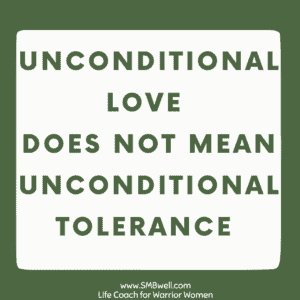Podcast: Play in new window | Download
Subscribe: Apple Podcasts | Spotify | Amazon Music | RSS | More
Let Them
Have you heard of the Let Them Theory? I am so excited to teach about it today because it has brought me great freedom in my relationships with my husband, my sons, my friends, and even my clients. Please listen in to this week’s episode to hear specific examples of how you can use the let them theory and then head to Instagram to share how you will practice it this week.
I make the Love Your Life Show each week to help you learn tips and tools to live a life you love. Listening to the show is a magnificent way to begin to reprogram your brain. It’s a first step. And, I want more for you. I want you to take that next step of learning so you move quicker into living a life you love. One of the best ways to do that is to think of how the topic I’m teaching on in the episode relates to your specific life. How could you use the tools and tips I speak of? In which ways are the examples I give similar to your life and in which ways are they different?
This week, I invite you to think of areas in your life where you feel out of control. That is to say, areas of your life where maybe you wish people were doing things differently. Are there certain relationships where you’re thinking they’re dong things the wrong way or if they did things a different way, your life would be better or easier? Please think of those specific times and areas and listen in. I promise practicing the two things I speak of in the episode today will help you feel more in control and free.
How is this Not About Me?
Did you know that the brain likes to take things personally? The brain has a default setting that filters the things that are happening around you in your life and tries to see how they relate to you. This is not narcissistic or self centered, it is how our brain is wired for our survival. That said, however, that does not mean it’s helpful to us or in our relationships.
The first practice I speak of in the podcast is a way of thinking I call “How is this not about me” thinking. It is an advanced way of thinking that tries to nudge our brain out of its’ automatic programming of thinking everything is about us. Not only does thinking this way help us feel more free and light, it is also super helpful for our relationships. Listen in to the episode to hear of specific examples how.
Let Them Theory
The second practice has gained recent popularity on Instagram through Mel Robbins and other celebrities. They are calling it the “Let Them Theory” and it’s a powerful technique that helps us break codependent thinking and behavior.
The premise is that people are going to do things in ways we think are incorrect or even wrong. As humans, we are vastly different individuals which means we think about things in incredibly diverse ways. Intellectually, most of us might think this is a good thing and something we strive for. However, in real life, it can feel very confronting to our nervous systems.
When our kids or husband or neighbor do things that we think are wrong, our nervous system can move into high alert. For me this can feel like a heavy tightness in my chest. My teeth actually feel tight and often my face will feel hot. It’s like there’s a little toddler in my head pounding her fists on a counter somewhere saying, but wait, that’s wrong! That’s the wrong way to do it. If you’ve had these thoughts or feelings, please listen in and practice this tool this week. Most people report feeling more in control and level of emotional freedom within days of practicing this.
Next Level Growth
How does this relate to you? Did you find that listening to the examples in the episode reminded you of something in your own life? Could you let me know by leaving a comment below or commenting on this week’s post in Instagram? Let’s keep the momentum of the “Let Them Theory” going.
People are going to do what people are going to do. We have very little control over it. What we do have control over is our thoughts about their actions, how we feel about their actions and our behavior while in relationship with them. When I allow other people to be them, in other words, when I “let them”, I feel freedom and there is less tension in my relationships. My kids and husband report that they feel more supported by me and, as a result, closer to me.
People will report feeling closer to you because you’re moving from codependent to interdependent behaviors. Codependent is inviting the neighbor’s kid over (when you don’t want to) thinking she will return the favor. Unhealthy relationship behavior is supporting your friends’ small business (when you don’t want to) because you expect she’ll reciprocate. Codependent behavior is rearranging your schedule (when you don’t want to) to attend your niece’s birthday party. Do you see a trend?
Unconditional Acceptance does not mean Unconditional Tolerance
Before finishing, it is important to clarify that accepting someone else’s behavior or letting someone else be them, doesn’t mean I support you being a doormat. Au contraire! Rather, I support you letting them be them while letting yourself be you. This is the backbone of boundary work. Boundaries are guidelines for how you want to be treated.
Say yes to letting your mom paint her room whatever color she wants. Further, say yes to having boundaries if she wants to call and complain about it. Say yes to your husband skipping his gym workout that strengthens his back. And speak up and say that you’re not a want match for him when he complains of his back pain. Say yes to your teenage son making pizza for breakfast. And, give him a hug and a “what are you going to do about it” when he says he’s too hungry.
Resources Mentioned:
Podcast supporting our current level of development. No more Black/White, Right/Wrong






